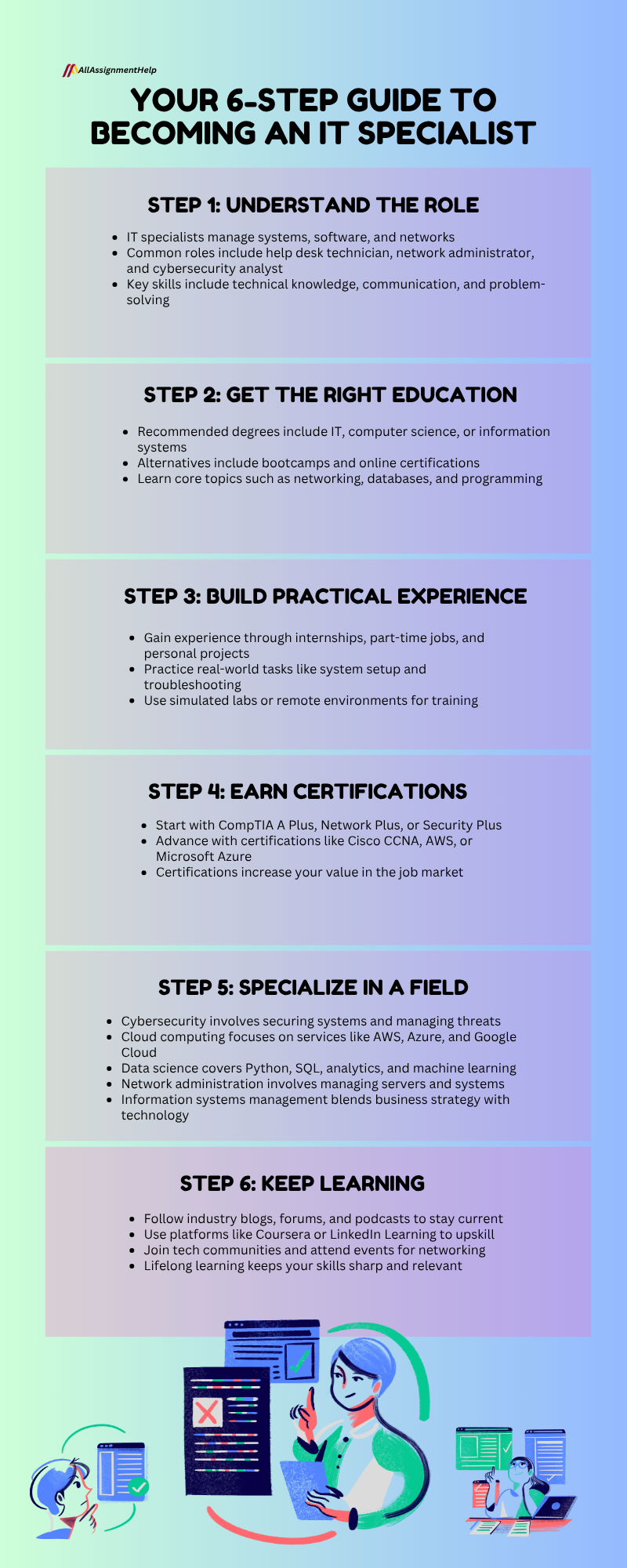Table of Contents
IT is now a key part of most industries, from health care to finance, education, and entertainment. The need for skilled IT professionals could only surge with this fast digital progression. Therefore, it promises to be one of the most fulfilling and secure career options. If you are a fresh college graduate, a tech gadgetry junkie, or a career shifter, then pursuing the path of an IT specialist might just be the big break that you are looking for.
But it takes more than passion for computers to break into the field. It has become competitive, so you need just the right balance of education, experience, and certifications. This guide by All Assignment Help will give you the six-step blueprint that you can follow to start and succeed in your path to becoming an IT specialist.
Who is an Information Technology Specialist?
An IT specialist is someone who organises the computer systems, networks, and software in a company by managing and supporting the technical aspects. They keep the technology infrastructure running, with tasks like hardware and software troubleshooting, security system management, and software updating. Moreover, IT specialists might also help with data management, system integration, or even user support. They work in many industries to keep businesses efficient and secure with dependable tech operations. Furthermore, they help in cloud computing, cybersecurity, and the development of systems. In this multidisciplinary domain, strong problem-solving abilities and technical expertise are needed.
Step 1: Understand the Role of an IT Specialist
This entails dealing with information-based and IT-oriented knowledge such as overseeing, maintaining, servicing or repairing technology systems, computer hardware, software applications, networks or databases. Working behind the scenes like IT specialists, keeping systems running correctly, security and user help, making sure that the workflows can continue without interruption.
An IT professional may work as a help desk technician, network administrator, cybersecurity analyst, or systems engineer, depending on the organisation and other specialisation areas. There are at least hundreds of each of those, from new hardware to new setup software to traffic in and out of the network and combating incursions across the spectrum.
Then the complementary skills are critical thinking or communication, and problem solving. Hence, soft skills play an equally important role along with technical skills. Ability to translate complex problems into basic, simple terms to people who may or may not work in your field. It is very common in IT to interact with people in all departments.
In addition to this, online assignment help services can also help students complete their IT-related courses for academic advancement and gain recognition for such courses. Whether it is self-study or should be directed by an expert, it lays down the foundation for aspirants in IT to learn and comprehend the roles and responsibilities of the ever-growing field.
Step 2: Get the Right Education and Training
Education and training form the basis of becoming a successful IT specialist. However, a bachelor’s degree in information technology, computer science, or a closely related field is preferred by most employers. Some entry-level positions may be filled by associate degree holders or certified candidates. Classes are available in networking, databases, programming, cybersecurity, and operating systems — everything that provides a solid technical foundation.
Learn to code online. If you’re in high school, have a good grounding in maths, computer science, and logical thinking. This will even serve adult learners or career switchers. When it comes to developing technical skills, there are flexible, low-cost options like online IT courses, coding boot camps or even some community college offerings.
With time and location often posing constraints, many students turn to online learning for flexibility. However, juggling deadlines and handling technical assignments in a virtual setup is not always easy. This is where online class help services become essential. They assist students in managing their workload, understanding complex topics, and keeping up with challenging IT subjects.
Additionally, search for programs containing labs, simulations, or internships in which you can apply your learning to practice.
Also read: Online Physics Degrees: Are They Useful in Today’s Scenario?
Step 3: Build Practical Experience
While theoretical knowledge is certainly necessary, the experience of practitioners is one of the things that sets specialisations in the IT area apart. Each company wants a person who can use their skills in practical situations. They have to troubleshoot hardware issues, install networks, set up systems, or respond when things go haywire. This is precisely why the vital next step in your journey is experience outside the classroom.
Begin by doing internships or volunteer, or part-time-level jobs in IT-based roles. It may also include providing some tech basic help on the side to your friends, family or local businesses. Others set up home laboratories to install servers, set up networks, and implement various security solutions using old machines or VMs.
For example, if you are learning through an online course, its simulated labs, platforms, or project-based components are valuable resources. They help you sharpen your skills and build a strong portfolio. However, during exam season, the pressure increases, and balancing coursework with practical tasks can become overwhelming. In such situations, many students turn to academic help services with queries asking, can you do my online exam for me? These services offer the necessary support, helping students manage their time effectively and meet deadlines without compromising on quality.

Step 4: Earn Industry Certifications
Industry certifications are optimal for demonstrating your technical skills to earn credibility as an IT specialist. These are endorsements that are recognised in the industry. They demonstrate that you have the capabilities, decks relevant to the tools, tech, or processes. Additionally, they are usually needed or at least preferred by employers during the hiring process.
Most widely recognised foundational certificates signal to potential employers that candidates have a minimum understanding of hardware, networking and cybersecurity. Preparing for such certs usually involves intensive technical reading and often exams centred around command-line operations, scripting, and system defence.
- CISSP
- Cisco certifications
- Certified Information Security Manager (CISM)
- CompTIA
- CompTIA Security+
- Microsoft Fundamentals
- AWS Certified Cloud Practitioner
- Cloudera Certified Associate Data Analyst
- CompTIA Network+
- Google Professional Cloud Architect
- Certified Information Systems Auditor (CISA)
- Giac Information Security Fundamentals (Gisf)
- ITIL
- Certified ScrumMaster
Several of these topics will correspond to subjects you may not be studying for an IT course. If you are struggling to perform well on some topics or if your programming assignments are behind due to a packed schedule, you can seek help from programming assignment help services. These services help to provide aid with hard assignments, code debugging, and concept clarification so that you can continue preparing for exams without pushing deadlines. Certifications set you apart, but also indicate that you care about your ongoing professional development.
Also read: Best Degree for Entrepreneurs in 2025
Step 5: Specialise According to Your Interest
After completing the foundation of IT, the next thing to do will be to choose a specialisation that you are most interested in and want to pursue as a career. However, IT being a vast field, you need to specialise in a particular field, so you become an expert and have better chances of employment and promotions.
Some sought-after specialisations are cybersecurity, cloud computing, networking, data science, software engineering, and management information systems. If you like defending systems and patching security problems, cybersecurity may be right for you. By pursuing information systems or data analytics, you could work with data, organising it and analysing it for business decisions.
Areas of specialisation
- Data Science and Analytics: The process of extracting information and insights from data, often for business purposes. Start learning Python, SQL, data visualisation tools, machine learning, and more.
- Software Development: Focused on the design and development of applications. You will learn programming languages such as Java, C++, or Python, as well as version control and deployment of the app.
- Cybersecurity: Deals with the protection of systems, networks, and data from cyber threats. It will teach you how to do ethical hacking, threat analysis, encryption, and compliance regulations.
- Network and Systems Administration: Handling servers, routers, and switches and keeping the network available. You will learn about network protocols, configuring and troubleshooting systems.
- Information Systems Management: Merging business and tech skills to manage IT systems and act in organisations. Classes could involve project management, systems analysis, and enterprise solutions.
- Cloud Computing: Focused on how to deploy and manage cloud platforms, such as AWS, Azure, or Google Cloud. Important niches are Cloud security, virtualisation, and cloud architecture.
Broader academic classes in these fields typically include deep material, case research, and engineering projects. Here, you can get the right information systems homework help if you are studying in an IT program and are struggling with system architecture, database management, enterprise networks, or other such subjects. These services ensure students can follow their subjects, even in their toughest assignments, while keeping up with their work.
Step 6: Keep Learning and Growing
IT is an ever-evolving sector. We discover new tools, programming languages, security threats, etc, and so on day to day. You must focus on continuous learning to stay relevant and updated. Being an IT specialist is a relative journey of skill gain and adaptation. Be it developing cloud services, machine learning, or ethical hacking skills, you can learn them in-course through the help of online platforms like Coursera, Udemy, and LinkedIn Learning that let you take short courses to learn new skills or better the existing ones.
Joining in-person and online professional communities nudges that growth along faster. Join forums such as Stack Overflow or local technology meetups, and also conferences. These communities offer you great networking prospects and help you stay abreast of the good practices or developments in the industry. Also, set learning goals for yourself every couple of months.
What Skills Does an Information Technology Specialist Need?
If you want to work as an IT specialist, you need to keep yourself updated with certain skills. This field is ever evolving. Hence, you need to learn continuously. Given below are some advanced technical, critical, and soft skills that you must work on.
- Coding
- Cloud computing
- Database management
- Analytic reasoning
- Data analysis
- Operating system
- Troubleshooting
- Computer networks
- DevOps
- Machine learning
- Python
- System administration
Other required skills are:
- Problem solving
- Creativity
- Leadership
- Computer hardware
- Project Management
- Communication skills
Conclusion
Though this is one of the rewarding careers but it needs an ideal combination of practical knowledge with technical skills and always learning. By following these 6 steps, you will not only develop a sustainable career that will last you through the changing landscape of technology, but also find joy at work. Better you should plan well in advance and start doing the needful. If you have the right approach of thinking like this, you are going to be industry-ready for one of the fastest-moving yet high-demand roles of IT today.
Frequently Asked Questions
Question: What should I do to be an IT specialist?
Answer: You need to gain relevant knowledge in the field, like associate-level degrees.
Question: How can I become an IT expert without a degree?
Answer: With the right skills, you can be an IT expert regardless of holding a degree or not.
Question: How much time would it take to become an IT specialist?
Answer: Depending on your education and speed of learning, this process takes 1–4 years.
Question: What is the best IT field to start in?
Answer: Helpful entry-level paths include network support, help desk, or systems administration.
